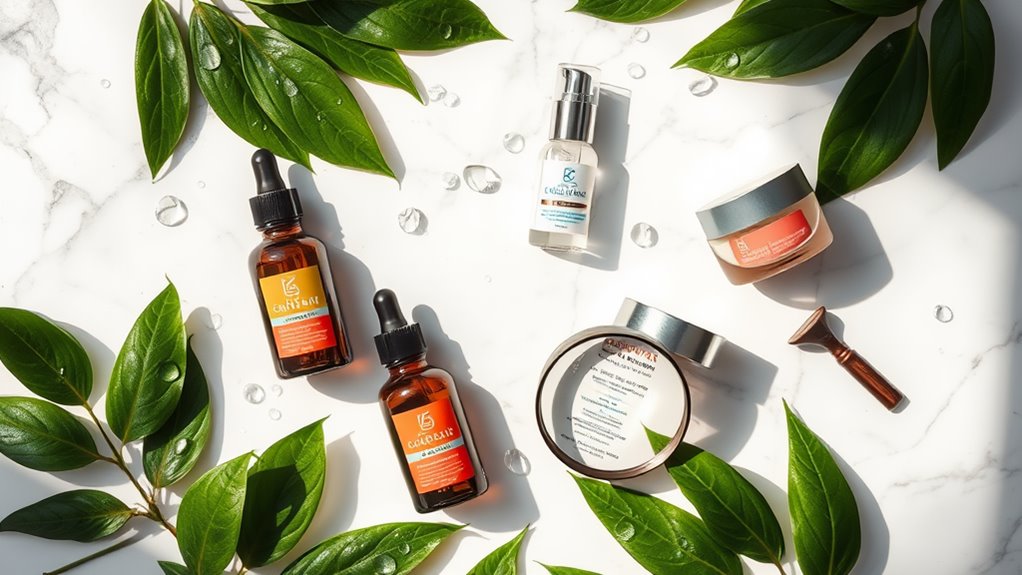Dermatologists Recommend Avoiding These 5 Skincare Myths
Dermatologists recommend you avoid five common skincare myths to boost your skin health. You need sunscreen even on cloudy days, and oily skin still requires moisturizer to stay balanced. Don’t assume expensive products work better; effectiveness hinges on ingredients, not price. Just because something is labeled “natural” doesn’t mean it’s safe, and some oils can actually help acne-prone skin. Keep these myths in mind to refine your routine and discover more insights on skincare.
Myth 1: You Only Need Sunscreen on Sunny Days
Many people believe that sunscreen is only necessary when the sun is shining brightly, but that’s a common misconception. You don’t have to be under direct sunlight to experience the harmful effects of UV rays. Even on cloudy, overcast days, up to 80% of UV radiation can still reach your skin.
Skincare myths like this can lead to serious skin damage over time, including premature aging and even skin cancer. Wearing sunscreen daily—regardless of the weather—protects your skin and keeps it looking its best. By incorporating SPF into your morning routine, you’re not just safeguarding against visible sunburns; you’re also defending against invisible damage that occurs even when it doesn’t seem sunny outside.
Additionally, many people underestimate the importance of using sufficient sunscreen, which can further increase your risk of skin damage. Joining others in this proactive skincare habit fosters a sense of community as you all prioritize skin health together. Remember, when it comes to protecting your skin, every day is a good day for sunscreen!
Myth 2: Oily Skin Doesn’t Need Moisturizer
While it might seem counterintuitive, even oily skin needs moisturizer to stay healthy and balanced. Skipping it can lead to dryness, prompting your skin to produce even more oil. Finding the right lightweight, oil-free formula maintains hydration without clogging pores.
Here’s a quick look at why moisturizing oily skin is essential:
| Reason | Description |
|---|---|
| Prevents Overproduction | Moisturizers help regulate oil levels. |
| Balances Hydration | Keeps your skin from feeling tight or dry. |
| Enhances Barrier Function | Protects against environmental stressors. |
| Boosts Skin Texture | Aids in achieving a smoother appearance. |
| Reduces Acne Risk | Hydrated skin is less prone to breakouts. |
Additionally, using the right moisturizer can improve skin health by preventing common issues associated with oily skin.
Myth 3: Expensive Products Are Always More Effective
Not all expensive skincare products guarantee better results. Think about it: just because a product has a high price tag doesn’t mean it’ll work wonders for your skin.
Many factors contribute to a product’s effectiveness, including your unique skin type, its specific needs, and the ingredients inside.
Affordable brands often offer high-quality formulas that can deliver fantastic results without breaking the bank.
The truth is, marketing plays a huge role in the pricing of skincare products, and sometimes you’re just paying for the label rather than actual effectiveness. In fact, understanding overpriced skincare can help you make smarter choices about your skincare budget.
To find what works for you, focus on ingredients and try products that align with your skincare goals.
Join forums and community discussions to share experiences and recommendations.
Remember, it’s about what makes your skin feel great, not just what looks chic on your bathroom shelf.
Embrace the journey to find your perfect match!
Myth 4: Natural Ingredients Are Always Safe
Just because a product boasts natural ingredients doesn’t automatically mean it’s safe for your skin. Many people assume that “natural” equals “safe,” but that’s not the case. Ingredients like essential oils, for example, can cause irritation or allergies for some.
You might feel tempted to trust trendy products based on their natural label, but it’s essential to do your homework. Not all natural ingredients have the same effects on everyone. What soothes one person’s skin can irritate another’s.
It’s crucial to be informed, read ingredient lists, and even patch-test new products. Your skin deserves the best, and understanding what’s inside your products helps you find the right fit. Furthermore, many popular skincare ingredients can potentially damage skin barriers and lead to long-term sensitivity issues.
Join the conversation with others sharing their experiences—navigating skincare shouldn’t be done alone! Remember, just because something is natural doesn’t mean it’s right for you. Stay mindful and choose wisely.
Myth 5: You Should Avoid All Oils if You Have Acne
Many people believe that all oils are off-limits for acne-prone skin, but that’s a misconception. In reality, certain oils can actually benefit your skin and help manage acne. Oils like jojoba and tea tree oil have properties that balance sebum production and possess antibacterial qualities.
Rather than avoiding oils entirely, focus on choosing non-comedogenic options that won’t clog your pores. Incorporating the right oils into your routine can enhance hydration and reduce inflammation, making your skin feel nourished. Additionally, oils can work synergistically with hyaluronic acid benefits to provide optimal hydration for your skin.
It’s essential to listen to your skin and observe how it reacts to different products. Remember, skincare isn’t one-size-fits-all, and what works for your friend may not work for you.

